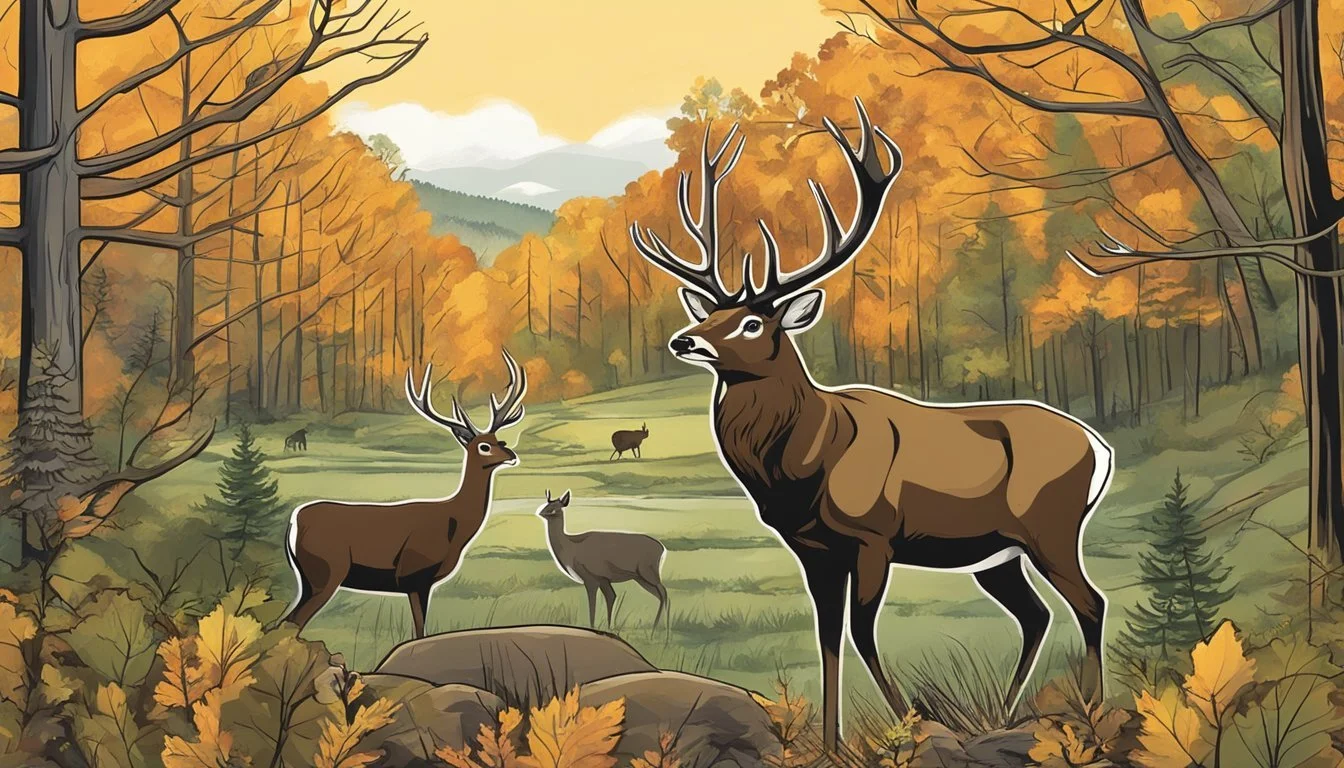Hunting Seasons in Rhode Island
A Comprehensive Guide
This Article is Part of Our Hunting Seasons Guide for All 50 US States
Rhode Island offers a diverse range of hunting seasons to outdoor enthusiasts, catering to various types of game and hunting preferences. The state carefully regulates these seasons to ensure sustainable wildlife populations and provide ample recreation opportunities for hunters. Each season is designated with specific start and end dates, and hunters must comply with the established bag limits and rules set forth by the Rhode Island Department of Environmental Management.
One significant aspect of Rhode Island's hunting regulations is the differentiation in season dates and bag limits for various species. For example, deer hunting is a popular activity in the state with a season that typically begins in September and extends into January or February, depending on the method of take, such as archery or shotgun. Meanwhile, smaller game species and waterfowl have their own designated seasons, ensuring that hunting activities align with species population management and conservation goals.
Specific areas within Rhode Island, including Block Island and certain National Wildlife Refuges, may have additional rules and application processes for hunting permits, underscored by lottery systems to manage hunter numbers. These regulations are in place to balance the demand for hunting with ecological preservation and to provide equal opportunities for participation. Hunters are advised to familiarize themselves with the latest updates and requirements each season to fully adhere to the regulations set by the state.
Understanding Rhode Island Hunting Regulations
Rhode Island's hunting regulations are established to ensure the safety of hunters and the sustainability of wildlife populations. Compliance with these rules is critical for a lawful and ethical hunting experience.
General Regulations
In Rhode Island, significant regulation changes for the 2023-2024 season affect where and how hunting can be conducted. For instance, the North West Cooperative in Glocester is now closed to hunting. Use of deer decoys is permitted on state-owned Wildlife Management Areas during archery-only deer seasons. Furthermore, deer hunters are allowed to use one dog to aid in the recovery of a downed deer.
Hunting safety is paramount, which is why anyone in state-managed areas during specific seasons must wear 200 square inches of solid daylight bright orange for visibility. This rule helps prevent accidents and ensure that all individuals in the area, whether hunting or not, are easily seen.
Licenses and Permits
A Rhode Island hunting license or a combination hunting and fishing license is required to hunt on public reservations and undeveloped State parks, as well as Tidal Lands as specified by Rhode Island General Laws Titles 20 and 18. Hunting licenses can be suspended or revoked for violations of hunting rules. Resident and non-resident hunting licenses are available, each with its requirements and fees. It’s essential for hunters to obtain the appropriate licenses and permits before the hunting season begins.
Hunting Zones and Units
The Rhode Island Department of Environmental Management (DEM) divides the state into different hunting zones and units to manage wildlife effectively. The DEM regulates the hunting seasons by setting specific dates and rules for each zone. These zones help in implementing targeted conservation strategies and managing the hunting pressure on various wildlife populations. Hunters need to be aware of the designated zones and units for which they have obtained permits and follow the specific rules that apply to these areas.
Seasonal Hunting Timelines
Rhode Island's hunting seasons are clearly structured to offer hunters the opportunity to harvest game within regulated times of the year, ensuring species conservation and management. Below are key dates and regulations for various game during their respective seasons.
Deer Season
Fall Archery: The deer archery season typically begins on September 15 and is open until January 31.
Shotgun: Runs from September 9 through December 20, then resumes December 26 through February 16. Hunters must use 10, 12, 16, or 20-gauge shotguns, and muzzleloaders are allowed during the shotgun season, given adherence to specific restrictions.
Turkey Season
Spring Gobbler: The spring season for turkey hunting usually opens in April. Dates can fluctuate, so hunters should verify the exact timeline annually.
Fall: The fall turkey hunting season dates also fluctuate and should be checked for the current year’s schedule.
Small Game Season
General: Small game hunting for species like pheasant begins with sunrise on opening day. Subsequent hunting days also start at sunrise. Each species has specific dates that are subject to change, and hunters are encouraged to consult the latest regulations.
Waterfowl Season
General: Waterfowl, including ducks and geese, have season dates that vary and can include special regulations such as those for sea ducks, scaup, and merganser.
Snow Goose: Specific to snow goose hunting, there are often designated seasons within the general waterfowl hunting period. Exact dates and bag limits are released annually.
Hunters should refer to the most recent Rhode Island Hunting and Trapping Regulations for comprehensive and updated information on season dates and any potential regulatory changes.
Specialized Hunting Opportunities
Rhode Island provides unique hunting seasons to foster wildlife conservation and ensure that various groups, such as youth and disabled hunters, have the opportunity to participate. These specialized hunting opportunities are carefully regulated to maintain the balance of ecosystems while accommodating the needs of distinct hunter demographics.
Youth and Disabled Hunters
Special seasons are crafted to allow youth hunters between the ages of twelve to fifteen to engage in deer hunting during designated weekends. These opportunities aim to instill a sense of responsibility and conservation ethics in the younger generation, often under the guidance of experienced hunters. Furthermore, Rhode Island acknowledges the importance of inclusivity in outdoor activities by providing disabled hunters with their own special season, ensuring that they can take part in the longstanding tradition of hunting.
Youth Archery and Muzzleloader Hunting Weekends: Reserved for hunters aged 12 to 15.
Special Season for Disabled Hunters: Specific dates allocated for hunters with disabilities.
Private and Public Land Hunting
The state distinguishes between private and public lands, each with its respective hunting regulations. Private landowners may opt to allow hunters on their property, sometimes for an enhanced access fee, which contributes to the upkeep and management of the wildlife habitat. On the other hand, state lands offer designated wildlife management areas where hunting is permitted during specific seasons and under particular conditions.
Private Lands:
May require an enhanced access fee.
Owners have control over hunting permissions.
State Lands:
Include wildlife management areas.
Certain areas may be closed to hunting for conservation purposes.
Game Management and Conservation
Rhode Island's approach to game management and conservation ensures sustainable wildlife populations and habitats. Through regulated hunting seasons, monitoring, and habitat management, the state maintains ecological balance and offers recreational opportunities.
Bag Limits and Harvest Reporting
Bag limits are crucial for controlling wildlife populations and contributing to conservation efforts. In Rhode Island:
Brant: The bag limit for brant is one per day.
Antlerless Deer: Specific bag limits apply, varying by season and management area.
Antlered Deer: Harvest of antlered deer is regulated to balance the deer population.
Hunters are required to report their harvests, providing the Rhode Island Department of Environmental Management (RIDEM) with data essential for managing wildlife populations and setting future hunting regulations.
Wildlife Management Areas
Rhode Island manages numerous Wildlife Management Areas (WMAs) to support wildlife conservation and provide hunting opportunities.
Management Areas: These areas are designated for different species and purposes, with specific rules tailored to each location.
Waterfowl Stamp: Hunters must possess a state waterfowl stamp to hunt waterfowl in these areas.
WMAs incorporate a range of habitats to support diverse species, including waterfowl, deer, and small game, contributing to the state's biodiversity and ecological health.
Hunting Equipment and Methods
In Rhode Island, regulations specify acceptable hunting equipment and methods, which aim to ensure safety and conservation. This section details restrictions on firearms and presents information on archery and crossbow hunting.
Firearm Restrictions
Hunters using firearms during muzzleloader deer season must adhere to specific restrictions. Only firearms of .45 caliber or larger are permitted, and these must utilize either percussion caplock, flintlock, or in-line ignition systems with percussion caps, rifle, or shotshell primers. Moreover, only single barrel or double barrel firearms that require muzzle loading are allowed.
Archery and Crossbow Hunting
Archery hunters can use a bow or crossbow to harvest game. Bows must be used in accordance with the stipulated hunting seasons and are an alternative to firearms for a more challenging hunting experience. Crossbow usage is governed by distinct regulations and may require additional permits or adherence to specific season dates.
Additional Hunting Opportunities
Rhode Island offers a variety of hunting opportunities beyond the traditional deer season that cater to both bird enthusiasts and trappers. These opportunities allow hunters to engage with diverse game species across the state's rich habitats.
Migratory Birds
Duck Hunting: Hunters are allowed to take a maximum of four mallards, of which only two may be females. New rules also state that the minimum number of goose decoys for hunting on SSMA premises has been reduced from 24 to 12.
Brant: With a shortened season of 30 days, hunters need to be mindful of the time frame. Additionally, the bag limit for brant has been singularly reduced to one per day.
Other Birds: Beyond ducks and brant, opportunities extend to harvesting other species such as dove and quail (What wine goes well with quail?). Hunters should always check the latest regulations for bag limits and season dates.
Furbearer Trapping
Rhode Island permits the trapping of various furbearer species, including coyote, fox, raccoon, and squirrel, under its furbearer trapping regulations. Trapping these animals serves not only the purpose of game but also helps in managing their populations and ecological impacts.
Coyote & Fox: The trapping season typically aligns with the peak activity periods of these furbearers. Trappers must adhere to state regulations regarding trap types and visitation frequency.
Raccoon & Squirrel: Like coyotes and foxes, raccoons and squirrels provide trappers with a challenge. Season dates and licensing requirements are crucial pieces of information that trappers must procure before setting out.
For all trapping activities, hunters and trappers should remain aware of the specific licensing and permit requirements necessary in Rhode Island, ensuring a respectful and legal pursuit of their activities.





